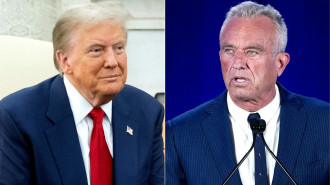As Egypt economy collapses, police harasses undocumented Nigerian migrants in foreign currency push
Nigerians living in Egypt say police have started to detain them over unpaid residency fees as it enforces a new law that compels all foreigners to pay for their visa overstay fees and residency permits in US dollars.
The law is part of a series of measures aimed at augmenting foreign currency, after Egypt suffered a shortage of US dollars amid rising debt and inflationary pressures.
The announcement caused panic among Nigerians and other migrant communities in Egypt who struggle to access foreign currency.
Several have told local media they are being harassed by police due to their failure to pay the fees.
According to a new law passed in December, undocumented migrants already staying in Egypt must "regularise" their status and pay a fine before 13 March or face jail.
The $1,000 fine must be paid in US dollars into a designated account at Egyptian banks or its equivalent in Egyptian pounds, providing a receipt from a registered bank that shows the fine was converted from foreign currency into Egyptian pounds at the official rate.
This measure has caused panic among many migrants in Egypt, notably in the Nigerian community, as reported by the Nigerian media Saharareporters.
Nigerians who spoke told the outlet they can't access dollars, as most workers are paid in Egyptian pounds and Egyptian banks have severely restricted access to foreign currency.
Many banks have also limited foreign currency withdrawals and increased credit card charges.
The requirement to pay for visa extensions and residency permits in dollars was introduced recently. Egypt is enmeshed in a severe currency crisis and struggles to keep liquidity, so the measure has been widely interpreted as a way to force foreigners to hand their US dollars to banks, instead of exchanging them outside of the formal banking system.
Egypt has only $34 billion in foreign currency reserves compared to $41 billion last February, while its foreign debt has more than tripled in the past decade to $157 billion.
There are currently at least two exchange rates in the country: the official one, which is set by the central bank, and the black market one, which is around half of the official rate.
The parallel market reflects the true value of foreign currencies in the hands of ordinary Egyptians, who do not have easy access to the official value of the currency usually reserved for major companies, and importers and exporters.
The gap has worsened between the two rates in recent weeks with Egyptian customers expecting their government to devalue the Egyptian pound and try to buy foreign currency on the black market to protect the value of their savings.
This has in turn worsened Egypt's liquidity crisis, since foreigners prefer selling their dollars on the black market rather than exchanging them at the bank at the official rate.
According to several Nigerians living in Egypt, the police have not waited for the end of the grace period to crack down on undocumented migrants with workers already detained for not being able to gather the money to pay the fine.
The Nigerians in Diaspora Commission (NiDCOM), a government agency under the Nigerian ministry of Foreign Affairs, said it was aware of the issue but could not intervene.
"We cannot intervene in the operation of another country," said Abdur-Rahman Balogun, NiDCOM’s Director of Media, Public Relations and Protocols. "It's a sovereign country."







 Follow the Middle East's top stories in English at The New Arab on Google News
Follow the Middle East's top stories in English at The New Arab on Google News
![Ben & Jerry's has taken Unilever to court for its alleged attempts to silence it [Getty]](/sites/default/files/styles/image_330x185/public/2024-11/GettyImages-2183900214.jpg?h=199d8c1f&itok=jEcYtQ64)

![The meeting between Musk and Iravani was 'positive', Iranian sources said [Getty]](/sites/default/files/styles/image_330x185/public/2024-11/GettyImages-2184077711.jpg?h=f5c1ac2a&itok=Wb2mIhsF)